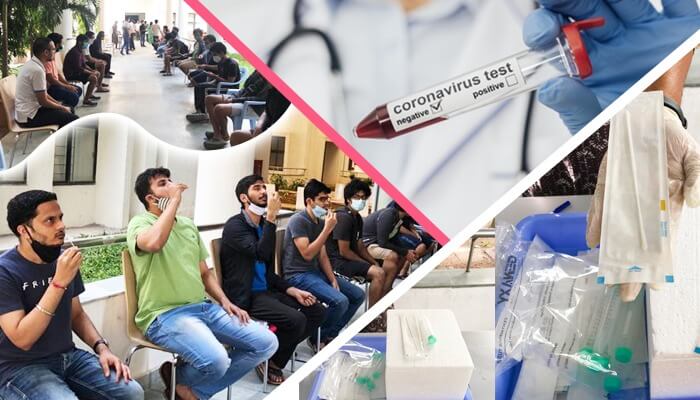Even as engineering colleges across the country await a governmental nod for resuming normalcy in academic sessions, IIITH is quietly rolling out a slew of measures as part of a pilot project that will help other technical institutes reopen their campuses with a Covid-19 readiness plan in hand.
“It is important to realise that this is the new normal. From what we’ve been hearing internationally with regards to various variants of the virus cropping up all over the world, the worst case scenario is that it will continue for another 1 or 2 years. So we have to learn how to get to do our normal business and be as productive as possible while maintaining medical precautions to keep our families and communities safe,” says Dr. Prabhakar Bhimalapuram, Chairperson, Campus Health and Medical Committee. As far back as last May, when the institute provided researchers the option of coming back to campus, protocols related to handling the pandemic were swiftly put in place. Undergraduate students too who demonstrated an inability to cope with online academic rigour for a variety of reasons were welcomed back.
Self-Quarantine
With the number of returning students set to nearly double over the immediate two months, the primary guideline for infection control remains unchanged. Before being allowed access to hostels and labs, all such students are mandated to quarantine themselves for a period of 14 days, at the end of which they are tested for the Coronavirus. Three building blocks are used for quarantining purposes while another block is used for isolating those confirmed Covid-19 positive. “The In-campus Quarantine and Isolation Facility (QIF) is available and open even to those who are not residing on campus,” says Dr. Bhimalapuram. The current infrastructure with bed and bath facility can cater to 75 quarantined and 24 isolated individuals respectively. For those mildly symptomatic and under isolation, a care package is in place under an agreement with Continental Hospitals.
Contact Tracing Via App
It was when the initial proposal of allowing researchers to come back was mooted that a simultaneous decision was taken to allow for contact tracing of infected individuals. “At that time, in addition to a few researchers, we had housekeeping and security staff too coming in from outside. So we decided that if one of them tested positive, in order to break the transmission chain, we need to trace all those who came in contact with the infected person,” explains Dr. Bhimalapuram. After a due vetting process that was kicked off by Dr. Anil Kumar Vuppala, the Ethics Committee approved the usage of the GoCoronaGo app for contact tracing. Designed and built at the Indian Institute of Science (IISc), Bangalore, the app uses bluetooth technology to detect other GoCoronaGo app users and creates a contact network. This way it helps identify primary, secondary and tertiary contacts of users who are later diagnosed as Covid-positive. Two things score in this app’s favour – First, individual privacy is maintained by anonymising user details in the form of unique IDs assigned to each individual. And second, it not only gives feedback on social distancing followed, but also serves as an actionable piece of arsenal in the fight against Covid-19. Dr. Bhimalapuram explains this by saying,”Unlike the Argoya Setu app which collects information on who is tested positive among people registered and reveals if they are within some distance of your location, the GoCoronaGo app starts with the idea that it has to locate possible contacts according to a particular definition which is internationally accepted. This is more useful to break the transmission chain.”
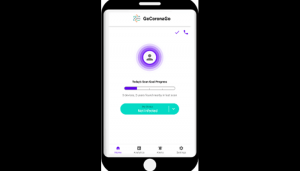
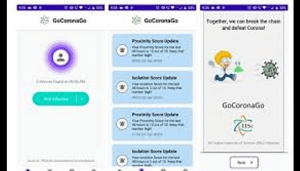
Test, Test, Test
Even amid reports of a resurgence of the virus in India and fears of a second wave, it seems like business as usual everywhere. On the IIITH campus itself, from January 1st onwards, all faculty and staff were required to come in 6 days a week. “With close to 200 non-residents coming into campus on a daily basis, the campus is no longer a bubble. The only way to fight the pandemic is to do surveillance constantly and a repeated weekly screening is one of the measures we are currently undertaking,” says Dr. Bhimalapuram. Currently available for students, faculty and staff only, every Monday a Covid-screening test is scheduled by the institute pro bono. The screening is part of a collaborative effort by the Centre for Cellular and Molecular Biology (CCMB) with a team from IIT Bombay, led by Prof. Manoj Gopalkrishnan. Interestingly, experts like Radha Rangarajan, Chief Scientific Officer, HealthCube and one of the mentors of the Ojas Medtech incubator housed on IIITH campus had advocated repeated screening for the Coronavirus last September in an article posted on LinkedIn. According to her, “In an ideal world, repeated RT-PCR testing should be undertaken.” She adds that this strategy has been adopted by some US universities opening their campuses to students. Arguing that India needs comprehensive testing protocols that are effective, scalable and affordable, she continues to say that if screening includes daily tests of temperature and oxygen saturation, self-declaration of symptoms, weekly antigen tests, monthly antibody tests and RT-PCR testing when needed, it would be possible to isolate infected individuals on time.
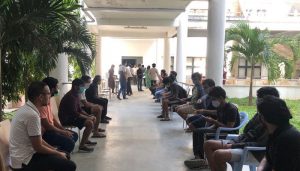
Affordable and Quicker
The current screening process on campus scores on the scalability and affordability front thanks to the Tapestry method of pooling swab samples developed by the IIT team. Using mathematical modelling, they have created an algorithm that decides how to pool samples for large populations with low prevalence. “For a resource-poor country like ours, individual commercial testing is just not feasible. Campuses and workplaces will have to resort to such measures in order to undertake large-scale screening,” says Dr. Bhimalapuram. Individuals who are screened positive are referred to a doctor who may then recommend another RT-PCR test along with other precautions. The weekly screening protocol is one of the models considered for inclusion in the suggested guidelines by the Remedial Action, Knowledge Skimming and Holistic Analysis of Covid-19 (RAKSHAK) project of the Department of Science and Technology (DST), Government of India for reopening of residential and other campuses across India. Finalization of the guidelines is expected to result in an official uptake of similar screening efforts by other technical campuses.
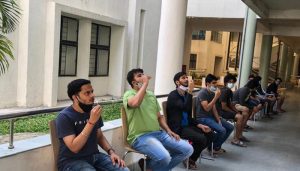
Sewage Water Surveillance
It is known that individuals infected with Covid-19 excrete the virus which ends up in waste water systems. Expanding its current active surveillance strategy, IIITH aims to test waste water on its premises before it merges with the city sewers. Sampling of such waste water is more cost-effective since it serves larger groups of population as opposed to individual testing. Particularly useful to detect asymptomatic individuals who otherwise may never land up at a clinic to get tested, this method has also emerged as an early marker of novel strains and mutants of the virus. “Our Engineering wing along with CCMB is engaged in talks so that we can monitor the presence of Covid-19 at the campus community level,” says Dr. Bhimalapuram. “We have a new Sewage Treatment Plant (STP) to filter both grey and black water and this is likely to be commissioned in the next few days. CCMB has evinced interest in sampling the water before it gets filtered,” says Srinivas K, Executive Engineer.
Along with regular precautions such as disinfection of common spaces, maintaining physical distancing, hand hygiene, use of the GoCoronaGo contact tracing app and regular screening, the IIITH campus is slowly humming back to life. “There are minor inconveniences no doubt, but if everyone participates in the community efforts, we can put an end to the chain of transmission. Our next efforts will be directed towards procurement of vaccines at the institute-level whenever non-governmental sales open up,” says Dr. Bhimalapuram.

